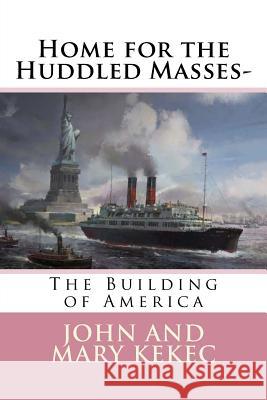Home for the Huddled Masses-: The Building of America » książka
Home for the Huddled Masses-: The Building of America
ISBN-13: 9781548530976 / Angielski / Miękka / 2017 / 146 str.
This story is about the lives of two generations of deep shaft coal miners and their families primarily during the five decades between 1890 and 1940. After immigration from Europe they spent their entire lives working and living in the mines and their associated camps in the southeast Kansas coal belt and the surrounding four-state area. In addition to having much local significance, due to all the local color and familiar scenes of its regional setting, it is definitive of immigrants and coal mining elsewhere. It turns back the clock for us and transports us back for a real taste of the lives of many of our beloved area ancestors during this early Industrial Evolution Era. This was the age of steam power, resulting in a worldwide boom in the coal mining industry. Thousands of willing workers were needed to work in the many new mines and factories that were springing up. Many were coming from the Austrian-Hungarian Empire, Italy, and other southern and Eastern European nations at this time. They were willing workers full of high ideals and believing that their hard work and virtue would see them through the hard times that lay ahead. They exemplified the poor but honest, self-disciplined, and hard-working characters that Horatio Alger had written about earlier. European families were immigrating to this country by the thousands seeking the greater offered opportunities. They didn't expect all the deprivation, desparity, and drudgery that most of them found waiting on them over here. Perhaps many thought that things would get better over here than the famine, oppression, and tyranny they had left behind. They were looking for the freedom and opportunity for a new start; and possibly even a rung or two up the social ladder. They all came together in what became a 'melting pot' for all these many ethnic groups and eventually became proud and patriotic American citizens Nevertheless most of them were working long hours for short pay, and had dangerous and unhealthy working conditions down in the deep coal mines or working in the many sweat-shop factories in the cities. And most of the families had to become accustomed to deprivation and living in the rather oppressive, and sometimes even degrading conditions of the coal camps, or in the dirty tenement housing in the big cities. In addition, due to the usual exploitation of most of these workers at this time, widespread labor problems and resulting riots were often occurring. After a decade or so things did start to get better for the immigrant miners. Technology was changing people's lives, especially during the first decades after the turn of the century in 1900, with everything coming along as from electric lights, telephones, and household appliances to horseless carriages, mechanized equipment, and other labor-saving devices. All these new conveniences meant new sources of energy were needed besides just coal, such as oil, and electricity; and new job opportunities besides just miners, such as oilmen, railroad men, highway construction men, and a multitude of new manufacturing workers for such expanding new industries as the motorcar plants, and textile mills. The story also reveals these generation's, personal problems and disappointments. It also reveals their reaction to the national news events that were taking place around them then, as well as the implications they had on their lives. These would include WWI, the Roaring Twenties and Great Depression years, and WWII. It tells about their struggling efforts in this rapidly changing era that was the vanguard of the rise to prominence of our great American nation. Today who would ever know that deep shaft immigrant coal miners and their families had ever once lived and worked here? It is now no more than a dream remembered; a civilization buried and gone in an era that has almost disappeared into the past. Yet some of us in these succeeding generations can still hear those voices calling to us from across the years
Zawartość książki może nie spełniać oczekiwań – reklamacje nie obejmują treści, która mogła nie być redakcyjnie ani merytorycznie opracowana.











